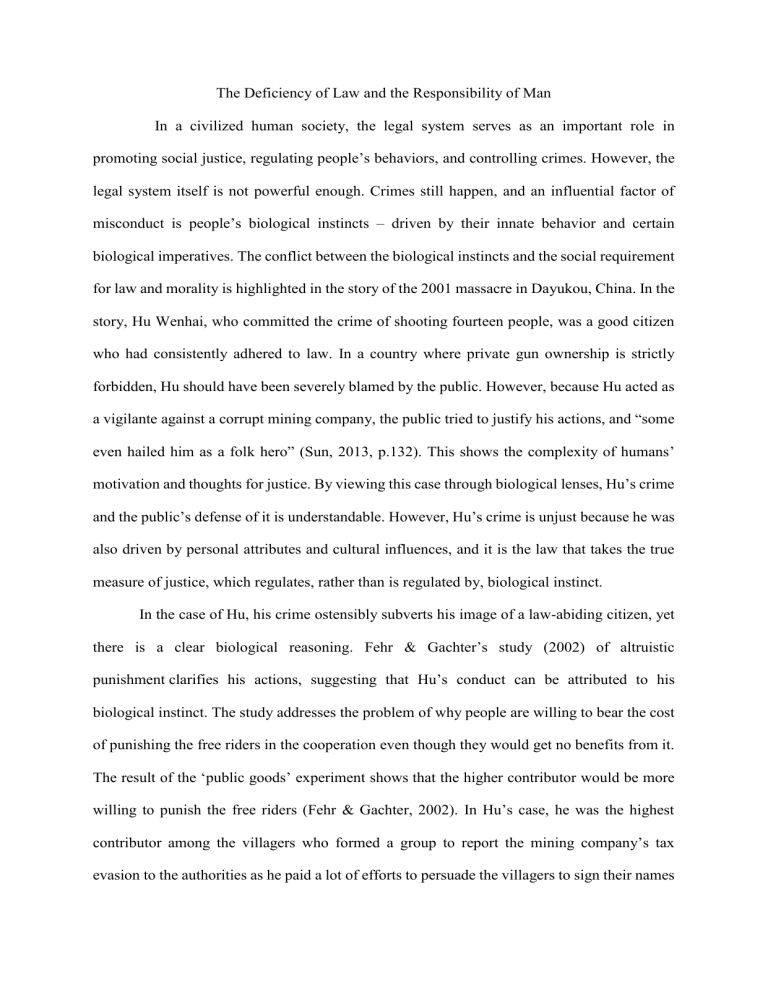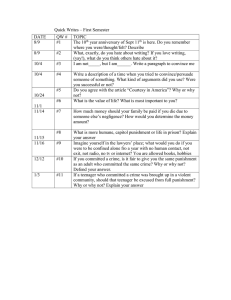
The Deficiency of Law and the Responsibility of Man In a civilized human society, the legal system serves as an important role in promoting social justice, regulating people’s behaviors, and controlling crimes. However, the legal system itself is not powerful enough. Crimes still happen, and an influential factor of misconduct is people’s biological instincts – driven by their innate behavior and certain biological imperatives. The conflict between the biological instincts and the social requirement for law and morality is highlighted in the story of the 2001 massacre in Dayukou, China. In the story, Hu Wenhai, who committed the crime of shooting fourteen people, was a good citizen who had consistently adhered to law. In a country where private gun ownership is strictly forbidden, Hu should have been severely blamed by the public. However, because Hu acted as a vigilante against a corrupt mining company, the public tried to justify his actions, and “some even hailed him as a folk hero” (Sun, 2013, p.132). This shows the complexity of humans’ motivation and thoughts for justice. By viewing this case through biological lenses, Hu’s crime and the public’s defense of it is understandable. However, Hu’s crime is unjust because he was also driven by personal attributes and cultural influences, and it is the law that takes the true measure of justice, which regulates, rather than is regulated by, biological instinct. In the case of Hu, his crime ostensibly subverts his image of a law-abiding citizen, yet there is a clear biological reasoning. Fehr & Gachter’s study (2002) of altruistic punishment clarifies his actions, suggesting that Hu’s conduct can be attributed to his biological instinct. The study addresses the problem of why people are willing to bear the cost of punishing the free riders in the cooperation even though they would get no benefits from it. The result of the ‘public goods’ experiment shows that the higher contributor would be more willing to punish the free riders (Fehr & Gachter, 2002). In Hu’s case, he was the highest contributor among the villagers who formed a group to report the mining company’s tax evasion to the authorities as he paid a lot of efforts to persuade the villagers to sign their names on the petition and “shuffled up and down the bureaucratic ladder,” (Sun, 2013, p.123). Therefore, his negative emotion would be most intense when the petition turned out to no avail, and his willingness to take revenge was driven by this negative emotion. Additionally, the study shows that the more the free rider deviates, the more cost the punisher would pay to punish the free rider (Fecher & Gachter, 2002). This explains what motivated Hu to take the revenge even though he knew that he would be executed with the death penalty. The mining company that Hu was against evaded $170,000 in taxes in three years, which is a considerable deviation from others who pay the true tax liability according to the law, such as Hu. So, Hu was willing to spend so much time and effort to report the corruption to the government and sacrifice his own life to punish the mining company. Thus, Hu’s crime is understandable and is, to some extent, justified because he was motivated by his biological instinct to punish the defector of the society. Not only are Hu’s actions explainable through altruistic punishment, but the community acted out other biological conventions as well when they reacted to Hu’s misconduct. In 2017, Mendes et al. (2017) did a study proving that both chimpanzees and preschool children prefer watching the antisocial being punished to the prosocial being punished. In the experiment, both the chimpanzees and the children were willing to incur costs (physical efforts and monetary expenditures) to continue to watch the antisocial being punished. However, when the prosocial were punished, the proportion of the subjects paying efforts to watch the punishment decreased significantly. To the community, the mining company’s tax evasion was antisocial behavior because it offended the law and did not get the punishment it deserved. Because of the connivance of the government, such illegal actions would be committed more, and harm the welfare of the whole society. So the “public sentiment was fueled, in part, by anger against the rampant corruption of government officials,” (Sun, 2013, p.132). On the contrary, Hu was prosocial because he devoted himself to punishing the mining company for the greater good of the community. “He had rid the community of several rogue officials, bullies, and criminals… Because of this, Hu’s case evoked a great deal of public sympathy; some even hailed him as a folk hero,” (Sun, 2013, p.132). This demonstrates why most people were on Hu’s side and tried to defend Hu from the death penalty. They did not want to see a prosocial being punished because they had empathy on him and viewed the deaths of the fourteen people as the punishment of the antisocial. In addition, Brosnan and de Waal’s 2003 study of fairness provides further reasoning for the public’s unexpected reaction towards the crime. The experiment shows that the monkey being rewarded a cucumber (a less preferable reward) will show the strongest refusal when seeing another monkey being rewarded a grape (a better reward) without any effort (Brosnan & de Waal, 2003). There is no difference for the villagers. They worked hard but only earned annual salaries of around 10,000-20,000 yuan (Sun, 2013), or $1,200-2,400 USD. However, the mining company got 1.25million yuan, or $170,000 USD, through tax evasion without any effort. The villagers saw this as unfair, and thus were enraged by it. This led to their defense of Hu because Hu’s crime not only displayed his own refusal to the unfairness but also the villagers’. Hence, the public’s reactions are also justified biologically, making Hu’s crime seem even righteous. However, while both Hu and the public’s actions can be understood with biology, biology itself is not enough to entirely encompass Hu’s motivation. Another important aspect of his crime is the personal and sociological incentive. Hu sacrificing himself to take revenge and punish the mining company can be seen as selfless, but he was motivated by his selfishness combined with cultural norms. In the case, Sun (2013) states that “Hu’s credibility as a folk leader, his reputation among villagers, and his personal vengeance were all on the line with the petition,” (p.124). This implies that the failure of the petition will significantly violate his credibility as the leader and his reputation among the villagers. So, his crime was for sustaining his own credibility and reputation rather than upholding justice for the whole society. Hu’s personal vengeance was also a strong driving force. Believing Hu leaked their illegal tax evasion, the mining company sent people to attack Hu and seriously injured him. “He was ambushed and assaulted with shovels by his neighbors… Despite the viciousness of the unexpected attack, he was lucky to escape… mortal injury” (Sun, 2013, pg.122). So, Hu killing fourteen people that were related to the mining company was his self-protection, or he might be killed by the mining company. This action was also his revenge for both the attack and the failure of the petition. Sun (2013) presented that “Ancient Chinese society was run mostly by moral conventions” such as “revenge at all costs is the only mission and ultimate duty” and “blood revenge was taken as a duty to restore the honor,” (p.125-126). Under this cultural background, Hu sacrificing himself for revenge displayed the “legendary kung-fu masters’ spirit”(p.125), which would be respected and honored by others. Hu’s killing of the innocent child implies that he strongly believed in the traditional Chinese convention of blood revenge. Hu was afraid that if he did not kill that child, the child would take revenge for his father in the future. In order to prevent his own son being killed, Hu killed that innocent child. Both Hu’s fear of losing credibility and his actions of protecting his own interest reveal that his revenge is mostly driven by selfish factors, which can attest to Hu’s crime being immoral. Despite the failure of biology to entirely justify Hu’s actions, it plays a crucial role to explain the importance of the law. The law sustains social stability, and biology acts as a guide for creating laws and systems of punishment that motivate people to overcome some detrimental biological instincts and keep within the confines of civilized society. The ‘public goods’ experiment in Fehr & Gatcher’s (2002) study shows that the average investment in the punishment condition was higher in each session and in each period than the average investment in the non-punishment condition. This implies that people would cooperate more when they know that there is punishment. Law, thus, is a useful system to sustain long-term cooperation among society because it regulates people’s behavior and sets the rules of punishment for misconduct. This suppresses people’s incentive to cheat and commit antisocial behaviors because they already know the consequence of conducting illegal actions. Moreover, the experiment also shows that the punishment imposed on the defectors by the cooperators was harsh: their punishment significantly reduced the income of the defectors (Fehr & Gatcher, 2022). This reveals that people’s biological instinct would motivate them to punish the ones who violate the cooperation severely. Hu’s case makes the importance of the law more notable. Even with the law and knowing that he would be executed with the death penalty (Sun, 2013), Hu took the extreme actions, shooting fourteen people, to punish the corrupted mining company. Without the law, extreme crimes like this may happen more frequently, which would create chaos. Hu’s case also shows that although law sets the standard of behavior and the strict system of punishment which measures true justice, law itself is inadequate to completely subdue people’s biological instinct. Thus, people, themselves, should take the initiative to overcome the powerful biological influences to obey the law. In conclusion, part of Hu’s motivation and the public’s attitude could be attributed to biological instinct, which would make Hu’s crime seem justified. However, Hu’s motivation driven by his personal and sociological imperatives reflects a pollution of that justification, showing that his crime is not morally impenetrable. Additionally, the ultimate death penalty of Hu reveals that in a civilized human society, people should conduct their behavior according to the law, but not their biological instinct. Some biologically justified actions would still be immoral and create negative effects for society. Therefore, it is crucial for people to overcome the inclination towards biology to obey the law even when the law is not entirely satisfactory. Vigilantism, as shown in the case of Hu, is not an acceptable response to an inequitable legal system, even when it is biologically motivated. What is important for people is to control those biological imperatives and find the delicate balance between accommodating biological instincts while upholding the values of the legal system.


